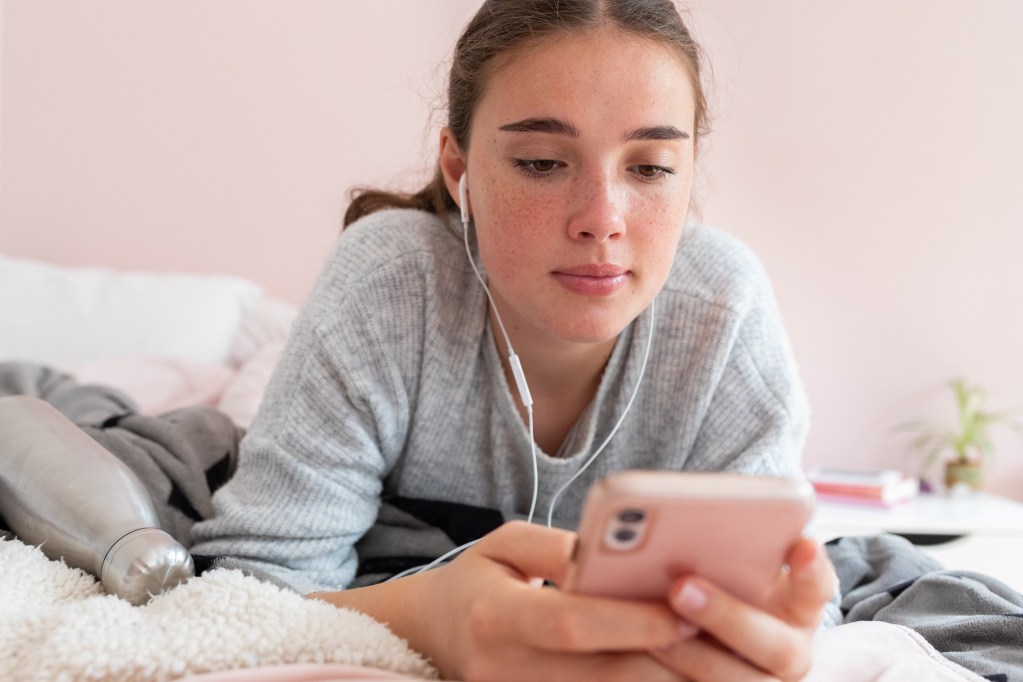
Does it feel like your child is always on their phone? Whether they’re watching YouTube videos, snapping friends, or scrolling endlessly on the latest social media sites, kids just can’t seem to put down those phones. Kids are on their phones so much that it can cause worry among their parents, who wonder what makes kids addicted to phones instead of normal use. Crossing a line from enjoying being on a smartphone to having a cell phone addiction can occur when the phone starts to have a negative impact on a child’s life.
Depression, aggression, anxiety, social withdrawal, suffering grades, loss of interest in activities, and poor sleep are all warning signs of having an addiction to cell phones. Cell phone addiction is on the rise among kids, tweens, and teens. Your child could be one of the many kids suffering from this affliction that impacts adults, too.
Thankfully, cell phone addiction is also a highly treatable condition. Once you recognize the signs of cell phone addiction, all is not lost. There is help available. If your kid could have a cell phone addiction, we’ve compiled the information you need to know.

Cell phone addiction: A compulsion
Lots of kids are drawn to as much screen time as you allow. The games, notifications, and texts give them hits of dopamine, a hormone that gives them a happy feeling. It can understandably be addictive. However, not all children exposed to screen time become addicted. So, what is the difference between liking screen time and being addicted to a phone? The answer is compulsive behavior.
Does your child seem to be constantly checking for new texts, social media posts, or notifications? Are they not able to stop playing a game when it’s time for practice or to do homework? Are they often worried about losing battery life or having a charger? Are they always lost in their own world with headphones in? The difference between addiction and normal use is that these behaviors happen so often that they interfere with your child’s daily life, and they can’t break away. Cell phone addiction can lead to depression, anxiety, stress, worse educational results, self-harm, and poor sleep. It can also lead teens to use cell phones while driving.

How high is cell phone addiction among kids?
There have been several studies that have determined the number of teens addicted to their cell phones to be between 25% and 50%. A study published in 2019 looked at 41 studies published between 2011 and 2017 and concluded that 23% of children have “problematic smartphone usage” that leads to negative mental health effects.
A 2016 report by Common Sense Media found that 50% of American teens “feel addicted” to their mobile devices. The same survey found that 59% of parents believe their kids are addicted to their devices. The same survey also found that 78% of teens check their devices at least hourly.
A Pew Research report froom 2018 found that 95% of American teenagers have smartphone access. It found that 9 out of 10 teens go online multiple times per day. The report also discovered that 45% of teens use the internet “almost constantly,” while 44% use the internet “several times a day.”

Cell phone addiction warning signs in kids
If you think your child is addicted to their cell phone, be on the lookout for red flags. Some possible warning signs of cell phone addiction in kids could include:
- Withdrawal-like symptoms when you don’t allow her to use her phone (the shakes, sweating, headache)
- Insomnia
- Anxiety or constant worry about where the cell phone is
- Self-isolation from people in the real world
- Anger and aggression over wanting to use the phone constantly
- A need to use the phone even when watching television, eating, or doing any other activity
- Excessive urgency to get to the phone

What can I do to help my child with cell phone addiction?
If you’ve discovered your child has one or more of the above-mentioned red flags, there are things you can do. Try some of the following steps to help break cell phone addiction.
- Don’t let your child use the phone in bed at night. This has very negative effects on sleep hygiene.
- Take phone breaks with teens. Don’t use your phone in front of kids either and be present with your time with children.
- Put your child’s phone in a special place during family time and give it back after screen-free time spent together.
- Install an app that sets screen time limits.
- Give kids other opportunities to get dopamine and engage their minds fully to distract from being bored without a phone, like sports, clubs, or other hobbies.
- Have family game nights.
- Read books together.
- Talk openly, but don’t lecture about the pros and cons of cell phone use.

Even kids are worried about their screen time
Teens seem to be just as aware of their increased time on their phones as their concerned parents and family members. According to a Pew Research Center survey done in 2018, 54% of those ages 13 to 17 who were surveyed admitted to spending too much time on their phones and were actively trying to limit their screen time. Over half the teens stated that “they associate the absence of their cell phone with at least one of these three emotions: loneliness, being upset, or feeling anxious.” There’s no doubt that parents often struggle just as much as teens with phone usage, and setting an example by limiting your own time on your phone is one step in helping model responsible phone use for everyone in the household.
If you find your child is addicted to their cell phone, try the steps above first. Another option, if those suggestions are not working, is to enroll your child in cognitive behavioral therapy for cell phone addiction. As always, checking in with your pediatrician is an important initial step whenever you’re concerned about the possibility of kids being addicted to phones. If your kid is exhibiting any of the warning signs or symptoms linked to cell phone addiction like depression or anxiety, it’s definitely time to seek professional help.



